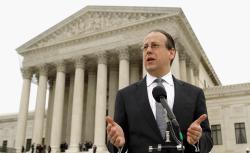As we wait for the Supreme Court to issue its decision on the health care law, ProPublica has rounded up some of the best, most revealing reporting on the issues at the core of reform.
The Cost Conundrum, The New Yorker, June 2009
The article that President Obama made required reading: Atul Gawande’s 2009 piece explores why health care costs in McAllen, Texas, were higher than almost anywhere in America. Its citizens weren’t sicker, nor its facilities much better. He concluded that “across-the-board overuse of medicine” was the best explanation for spiraling costs.
In Medicare’s Data Trove, Clues To Curing the Cost Crisis, Wall Street Journal, October 2010
One Medicare database, which contains records of every payment the program makes, is “widely considered the single best source of information on the U.S. health-care system.” Yet thanks to successful suit more than three decades ago by the American Medical Association, this “powerful tool” for sniffing out fraud and abuse can’t be accessed by average citizens. Doctors’ names—and the payments they receive—are all blocked from public view.
A Simple Health-Care Fix Fizzles Out, Wall Street Journal, February 2010
Studying different medical treatments to see which is most effective may sound like an obvious and promising way to stem America’s rising health care costs, but it doesn’t always work. Citing one study that showed that heart stents don’t achieve better results than “cocktail of generic drugs,” the WSJ explains that when doctors try to implement effective-but-cheaper methods, patients will go elsewhere to get the more expensive treatment.
Phantom Firms Bleed Millions From Medicare, Reuters, December 2011
Shell companies have scammed Medicare out of hundreds of millions of dollars, but exactly how much, and how often, isn’t clear. Medicare doesn’t have sufficient resources for targeting fraud. Overall, in 2010 Medicare lost nearly 10 percent of total payouts, or $48 billion, to “improper payments.”
The Hot Spotters, The New Yorker, January 2011
Another Gawande gem: Could we lower medical costs by focusing on better care for the neediest patients? The tactic worked on New York City crime, and several pioneering programs suggest similar tactics could have positive effects on our healthcare system.
Health Care History: How the Patchwork Coverage Came To Be, Los Angeles Times, February 2012
America’s health care system, with its emphasis on employer-provided health insurance, is somewhat of an anomaly. This article traces the history of how our system came to be, from World War II-era factories, to President Lyndon Johnson’s passage of Medicare and Medicaid, to Obamacare.
Overlapping Health Plans Are Double Trouble for Taxpayers, Wall Street Journal, June 2011
Nearly 10 million poor, elderly Americans qualify for both Medicare and Medicaid. Treatment for these double-counted patients is often expensive. And as the two programs squabble over who should pay, the patients themselves often end up without proper care.
How Insurers Reject You, Slate, February 2010
This dissection of BlueCross BlueShield of Texas’ 2009 coverage guidelines offers a peek at what underwriters consider when deciding which individuals may and may not purchase a policy: Any of 143 diseases earns you an automatic rejection.
Insurer Targeted HIV Patients To Drop Coverage, Reuters, March 2010
A company called Fortis, later known as Assurant Health, was the first insurance company to single out and systematically revoke policies of people with HIV, often “on erroneous information, the flimsiest of evidence, or for no good reason.” Insurers say the fairly common practice of “rescission,” or revoking policies shortly after issuance, helps them keep premiums down. But regulators and investigators say most cases lack a good reason for cancellation.
